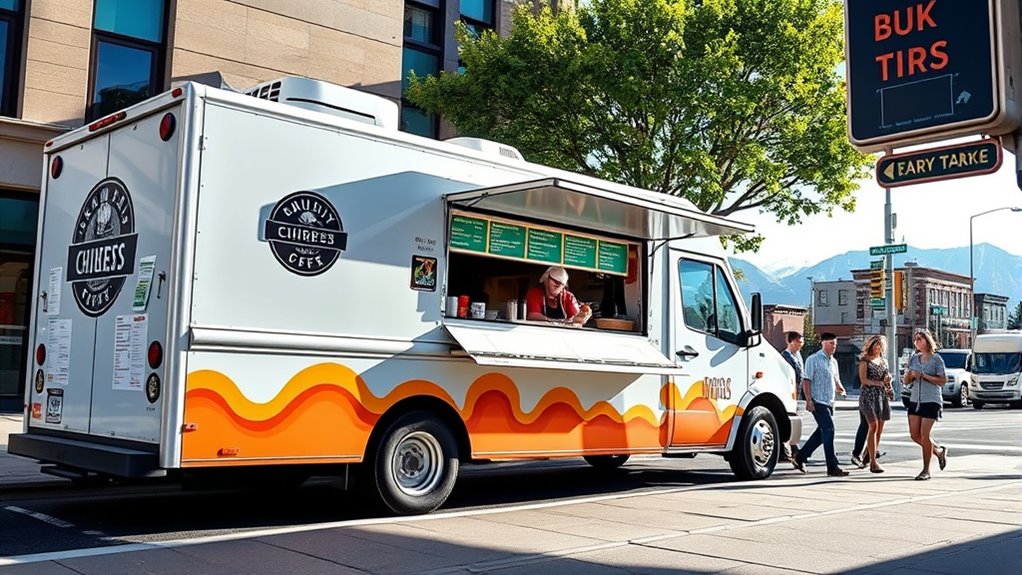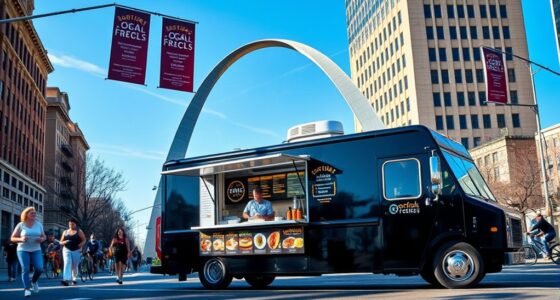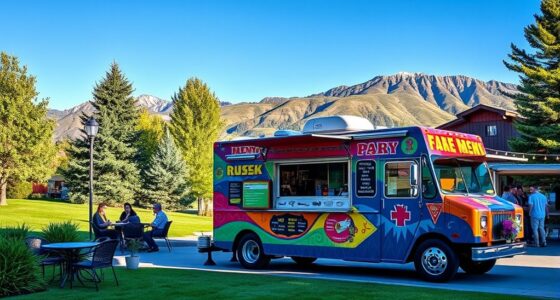To open a food truck in Salt Lake City, you’ll need to secure permits like a business license, health permits, and a food safety manager certification, plus find an approved commissary. Costs vary from $50 to $550+, and location choices are vital—focus on busy, permitted zones or private property. Develop a appealing menu, follow safety standards, and use social media for marketing. Continuing will give you detailed steps to start and succeed.
Key Takeaways
- Obtain necessary permits including a Salt Lake City business license, health permits, and food safety certifications before operations.
- Budget $50-$200 for licenses, $21.95 per employee for food handlers, and additional costs for fire safety, insurance, and supplies.
- Operate in designated zones like downtown, parks, or private property with proper zoning, signage, and parking permissions.
- Ensure compliance with health standards, proper water usage, waste disposal, and regular commissary visits for sanitation.
- Boost visibility and sales through social media, participation in local events, community engagement, and targeted marketing efforts.
Understanding Permit and Licensing Requirements in Salt Lake City
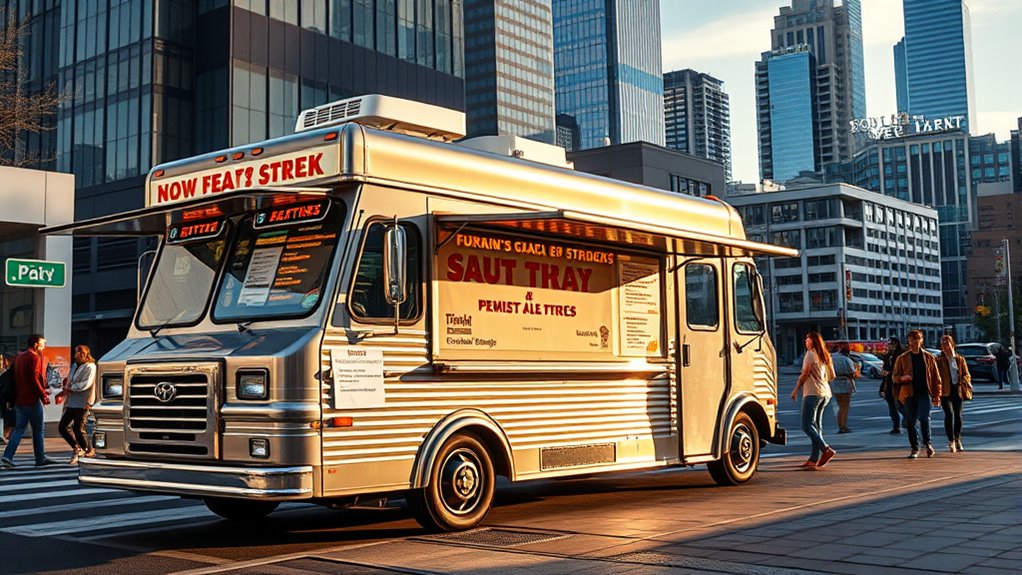
Are you planning to operate a food truck in Salt Lake City? You’ll need a city business license, which is mandatory for all mobile vendors within city limits, including private property. You must submit a valid driver’s license for each driver and provide proof of your State Tax Identification number. If working on private property, get written permission from the property owner. If you’re already licensed in another Utah city, reciprocal licensing is accepted—just show proof of your business license, health permit, and fire safety inspection. Additionally, you’ll need a Food Safety Manager Certification and Food Handler Permits for your staff. A detailed Plan Review Application, including your menu, truck design, and commissary agreement, must be approved before starting operations. Understanding Utah’s licensing laws and recent legislation is essential to ensure compliance and smooth operation. It’s also advisable to stay informed about positive thinking strategies, which can help you manage the stresses of starting a new business and maintain a resilient mindset through challenges.
Securing a Commissary and Ensuring Operational Compliance
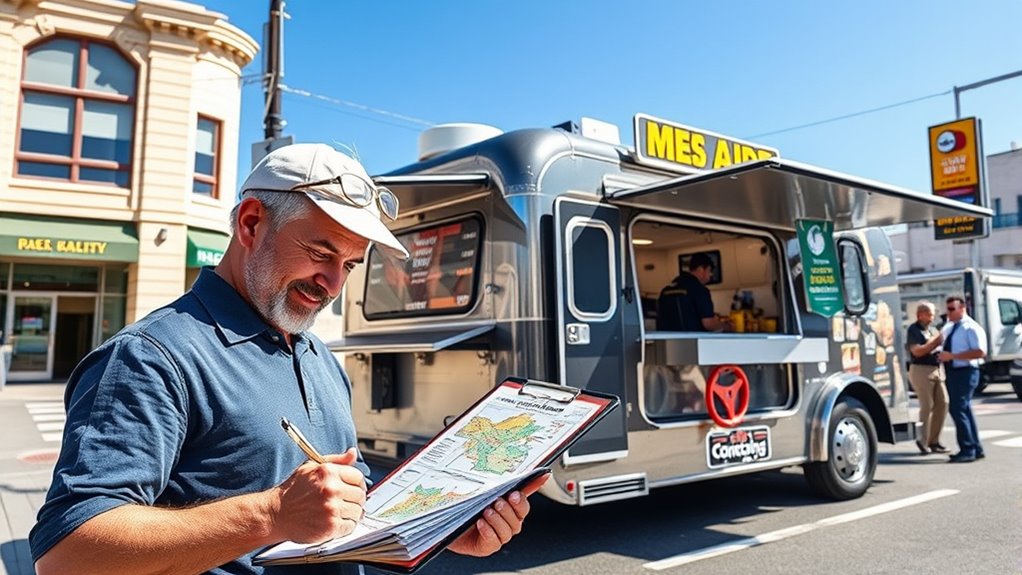
To operate legally, you need to secure a commissary that meets Salt Lake City’s licensing process, including a signed agreement renewed annually. Ensuring your commissary and equipment comply with health standards is vital for passing inspections and maintaining your license. Staying on top of these requirements helps keep your food truck running smoothly and within the law. Using modern browsers can help you access all necessary resources and updates related to licensing and health regulations efficiently. Additionally, understanding grocery savings strategies can help manage your costs effectively, ensuring your food truck remains profitable.
Commissary Licensing Process
Securing a commissary is an essential step for food truck operators in Salt Lake City, as all trucks must use a licensed facility approved by the Salt Lake County Health Department. You’ll need to find a commissary that meets strict requirements, including adequate storage, refrigeration, utilities, and parking. Guarantee the facility has no history of critical violations and obtain approval from the SLCOHD by submitting a signed Commissary Agreement. Before applying for your mobile food permit, complete a Certified Food Manager or Food Handler Course and register your business with the Utah Department of Commerce. Your commissary must support daily operations like cleaning, replenishing supplies, and waste disposal. Maintaining ongoing compliance with health standards is essential, including passing regular inspections and submitting food flow charts. Additionally, maintaining proper documentation and keeping detailed records of your operations can help streamline inspections and ensure ongoing adherence to health regulations.
Maintaining Health Standards
Maintaining health standards is essential for mobile food units to operate legally and safely in Salt Lake City. You must meet all Salt Lake Valley Health Department requirements on food handling, storage, and sanitation. Approval of any onboard food prep areas is mandatory, and your vehicle must be in good condition—free of rust or peeling paint. You’re prohibited from offering personal or professional services and need to provide trash and recycling receptacles, keeping your surroundings clean and attractive. Proper licensing and health department approval are required before starting operations. Ensure your wastewater tanks are properly flushed into the sewer system to avoid fines. Regularly return to an approved commissary for cleaning, storage, and maintenance tasks. Your commitment to hygiene, proper waste disposal, and operational standards not only safeguards public health but also secures your business’s success. Additionally, maintaining compliance with health regulations helps prevent potential citations and ensures ongoing operation.
Navigating Costs and Fees for Food Truck Licensing
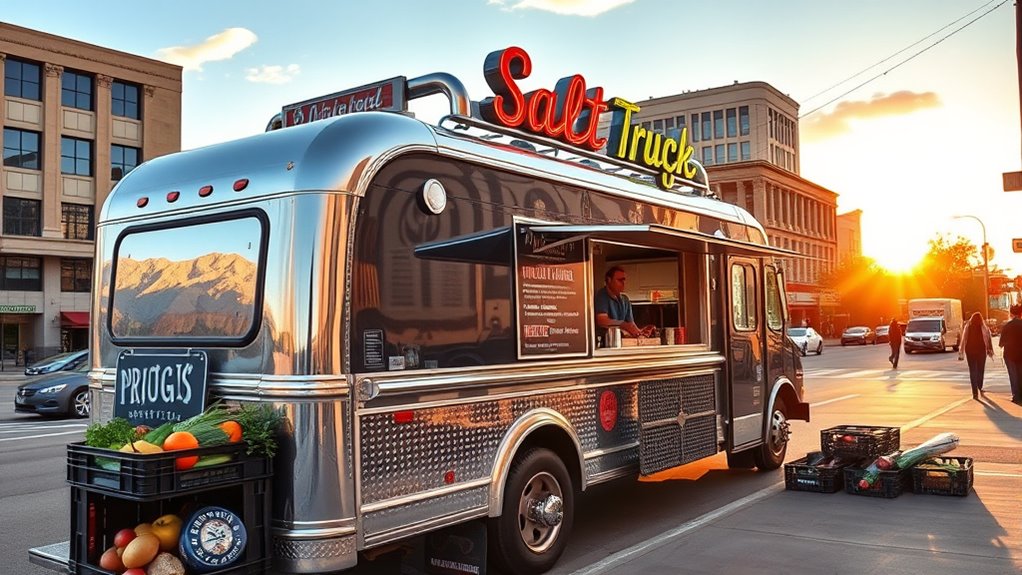
Managing costs and fees for food truck licensing in Salt Lake City involves understanding a range of expenses, from initial permits to ongoing compliance. You’ll need a local business license, costing between $50 and $200, depending on your jurisdiction. For first-time operators, you’ll obtain this from the city where your commissary is located. Health permits, like the Mobile Food Business Permit, range from $350 to $550 and are issued after a health inspection. Food handler and manager certifications cost approximately $21.95 per employee and $65 or more, respectively. You’ll also need a Sales Tax Permit, which has no fee, and a valid driver’s license with a commercial endorsement costing about $61. Additionally, fire safety inspections and liability insurance are necessary, with associated costs varying locally. Incorporating a suitable location with a farm-to-table focus can help attract customers seeking fresh, local ingredients.
Choosing the Best Locations for Your Food Truck Business
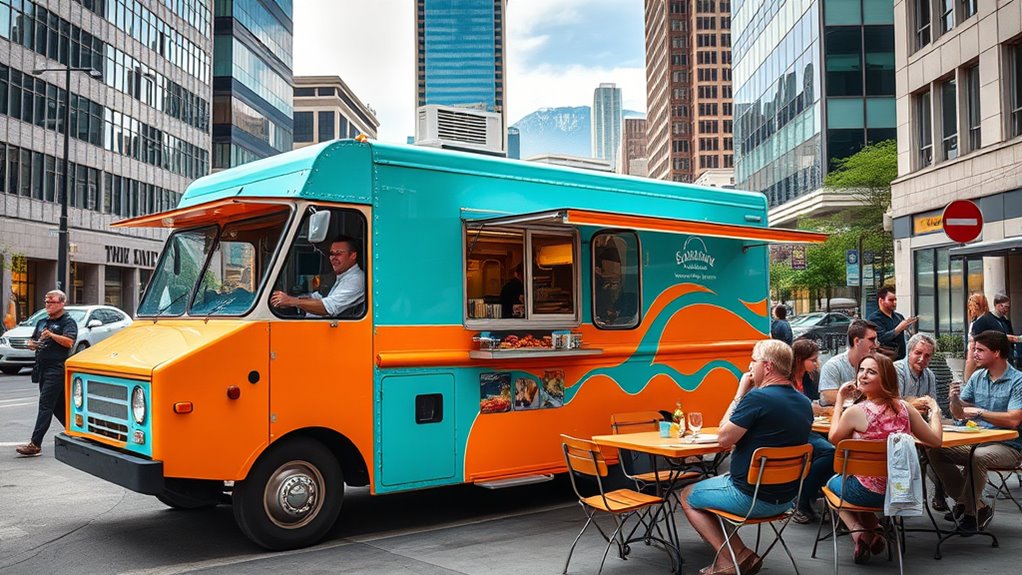
Choosing the right location is crucial for your food truck’s success in Salt Lake City. Your spot impacts visibility, customer flow, and compliance with city regulations. Focus on areas with high pedestrian traffic like downtown districts or near event venues, parks, and university campuses. Mixed-use zones offer diverse customers, while industrial zones can generate lunch crowds with less competition. Private property can be ideal if you coordinate permissions and utilities, but guarantee accessibility and zoning compliance. Remember, only one truck can operate on the same block face at a time in public right-of-way zones, and parking is limited to two hours without a permit. Avoid blocking fire hydrants, crosswalks, or driveways, and stay aware of street closures or special events that might affect your location. Mobile food trucks are permitted to operate only within designated zones, and ensure your chosen spot complies with this requirement. Additionally, understanding home decor & design principles can help you create an inviting space if you set up a permanent or semi-permanent location, enhancing customer experience.
Planning Your Menu and Ensuring Food Safety Standards
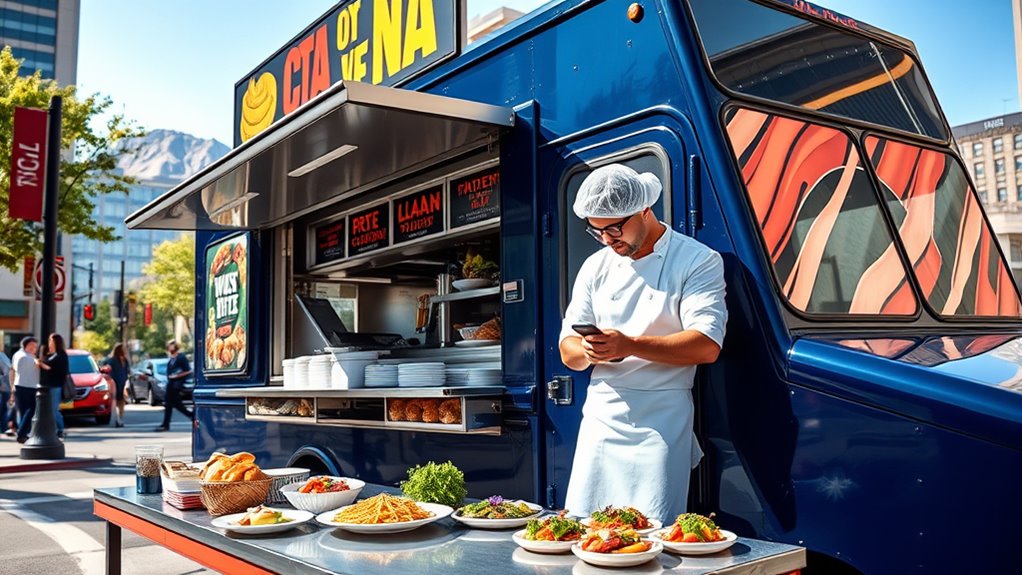
Creating a well-planned menu is essential for your food truck’s success in Salt Lake City. Focus on quick-to-prepare items that match the fast-paced service environment. Keep your menu limited but diverse to improve efficiency and reduce ingredient waste. Incorporate local and seasonal ingredients when possible to appeal to customers and cut costs. Make sure menu items fit your truck’s equipment and space constraints. Pricing should strike a balance between affordability and profitability. Ensuring food safety is equally crucial. Comply with Salt Lake Valley Health Department regulations, using an approved commissary kitchen and maintaining proper water and hygiene standards. Train staff on safe handling, proper storage, and sanitation routines. Regular inspections and documentation help keep your operation compliant and safe for customers. Additionally, understanding food spoilage signs and proper storage practices can help prevent foodborne illnesses and maintain the quality of your offerings.
Developing Effective Marketing and Promotion Strategies
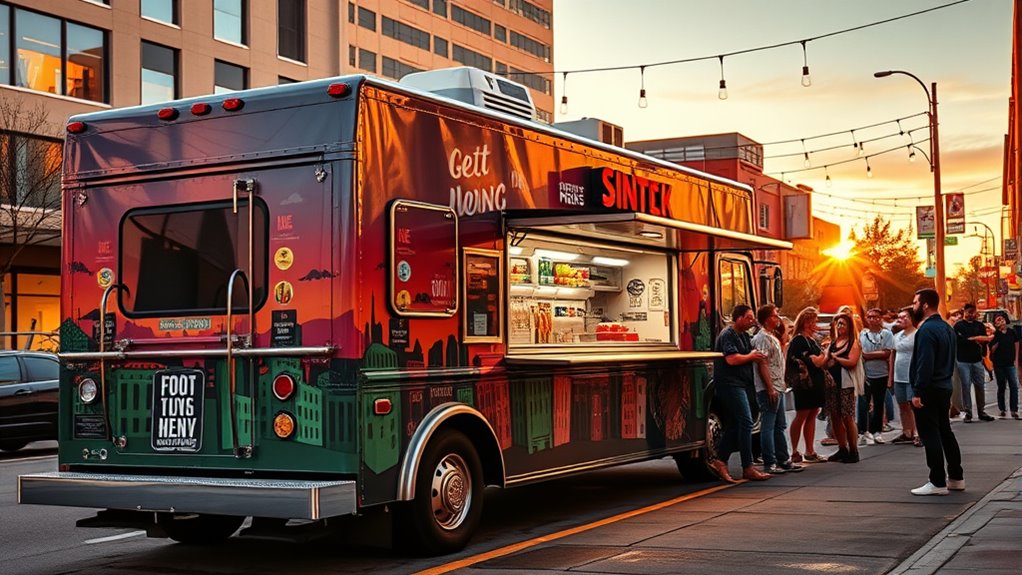
How can you make your Salt Lake City food truck stand out in a crowded market? Focus on smart marketing strategies that connect with your audience. Use social media, especially Facebook, to regularly engage customers and boost sales by up to 20%. Leverage local events and festivals—80% of trucks attend these to increase visibility and build loyalty. Implement customer loyalty programs to drive repeat business, with over 50% of trucks seeing a 30% increase in returning customers. Harness data analytics and location apps to target your marketing efforts more effectively, increasing returns by 25%. Additionally, participating in at least 3 festivals or events annually is a proven tactic to expand your reach and attract new customers as 80% of food trucks participate in such events. Incorporate community engagement initiatives to strengthen your local presence and foster loyalty. Balance your budget across digital campaigns, event sponsorships, and local partnerships to maximize reach without overspending. Your focus on innovation and community connection will set you apart in Salt Lake City’s vibrant food scene.
Tips for Successful Food Truck Operations in Salt Lake City
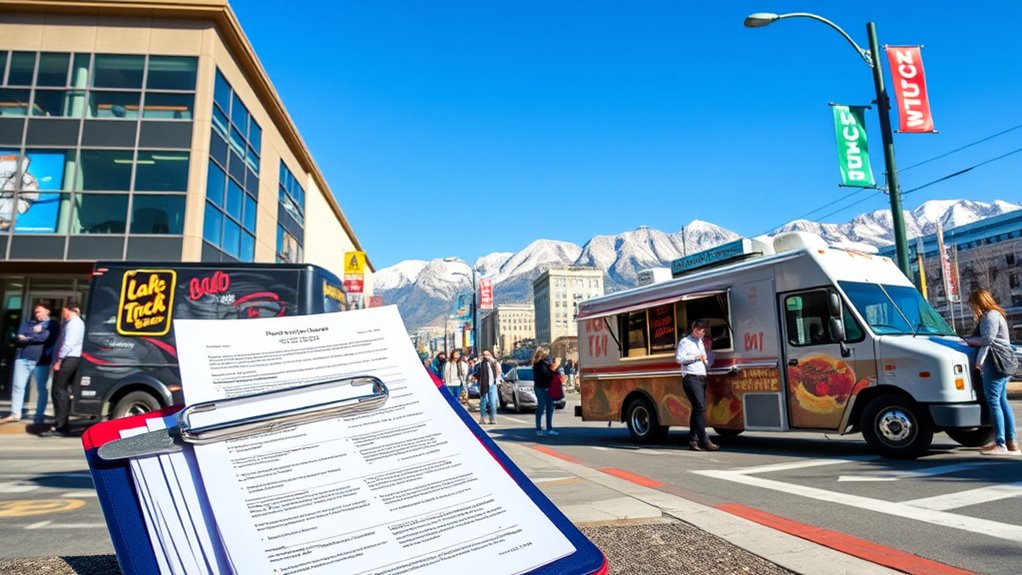
Successfully operating a food truck in Salt Lake City requires careful attention to regulatory compliance, parking strategies, and safety protocols. First, obtain a Salt Lake City Business License for each vehicle and ensure you meet zoning restrictions in zones like M-1, M-2, D-1 to D-4, and G-MU. Pass background checks and meet health department standards, including using an approved commissary kitchen. Limit parking to designated right-of-way zones, face vending windows toward sidewalks, and avoid projecting enclosures without approval. Limit parking to two hours unless permitted, and only operate one truck per block face to reduce congestion. Maintain proper sanitation, install potable water tanks, and ensure staff use gloves. Follow noise and alcohol restrictions, and plan location rotations to maximize sales and compliance. Operating a mobile food court requires prior conditional use approval to ensure lawful operation and adherence to city regulations. Additionally, understanding cookie consent management is essential to maintain compliance with privacy policies if digital marketing or online booking systems are utilized.
Frequently Asked Questions
What Are the Specific Zoning Restrictions for Food Truck Operation in Salt Lake City?
You should know that in Salt Lake City, you can only operate your food truck within specific zoning districts like M-1, M-2, D-1, D-2, D-3, D-4, and G-MU. You must avoid blocking traffic, driveways, or parking stalls. Also, your truck can’t stay in one spot for more than 12 hours in a day, and you need special permits if you want to operate outside these zones or extend parking times.
How Long Does the Permit Approval Process Typically Take?
Think of the permit process as a journey through a bustling marketplace; it takes time to navigate. Typically, it spans 2-4 weeks, but during peak seasons, it can stretch to 5-6 weeks. If you submit complete paperwork and stay in touch, you can smooth the path. Deadlines depend on multiple approvals—zoning, health, fire safety—and timely responses help you reach your goal faster.
Are There Any Restrictions on Menu Items or Food Types?
You need to know that Salt Lake City has strict restrictions on menu items and food types. You can’t sell alcohol, and all foods must meet health department standards, including allergen info and proper sourcing. Prohibited items include certain regulated products like unapproved dairy or meats. Additionally, your menu must be simple enough for quick service within designated zones, and extensive prep or refrigeration might not be feasible.
Can I Operate My Food Truck Year-Round in Salt Lake City?
You can operate your food truck year-round in Salt Lake City, but you must follow specific rules. Make certain you stay within designated zones and obtain all necessary permits, including a business license and health department approval. Be prepared for winter weather with proper equipment. Also, adhere to parking and time restrictions, maintain water and waste systems, and follow food safety laws to keep your operation compliant throughout the year.
What Are the Insurance Requirements Beyond Certification and Permits?
Like the foundation of a sturdy building, your insurance shields your food truck ambitions from unforeseen storms. You’ll need general liability coverage of at least $1 million, and commercial auto insurance for your truck and trailers, naming Salt Lake City as an insured party. Additional coverages like product liability and equipment breakdowns strengthen your safety net. Keep your certificates current, and verify compliance to avoid operational setbacks and protect your investment.
Conclusion
Starting a food truck in Salt Lake City is doable with the right planning and compliance. Some worry about costs or permits, but by following the steps and staying organized, you’ll find it manageable. Remember, many successful food truck owners started small and grew their brand over time. With dedication and a solid strategy, you can turn your culinary dreams into a thriving business—so don’t let initial hurdles hold you back.
